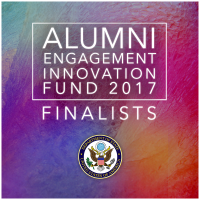AEIF Project Competition Winners
 Each year, the U.S. Department of State hosts its Alumni Engagement Innovation Fund (AEIF) project competition which supports alumni initiatives that promote shared values and innovative solutions to global challenges. This year, out of 1,014 project submissions, 68 teams have been selected as finalists. The coolest part? Four of these teams are composed of Global UGRAD Alumni!
Each year, the U.S. Department of State hosts its Alumni Engagement Innovation Fund (AEIF) project competition which supports alumni initiatives that promote shared values and innovative solutions to global challenges. This year, out of 1,014 project submissions, 68 teams have been selected as finalists. The coolest part? Four of these teams are composed of Global UGRAD Alumni!
Read on to learn more about these four Global UGRAD AEIF finalists’ projects!
Bangladesh: Pathway to Progress (Education and Inclusion)
Pathway to Progress will enhance the English language skills of minority students through reading, writing, speaking, listening, and grammar workshops taught by professional trainers and teachers. The project will help improve their academic performance while reinforcing the benefit of strong English language skills in the globalized economy. Developing the human capital of these marginalized populations will also contribute to their social, economic, and political integration.
El Salvador: Don’t Stop Dreaming (Business Development and Economic Opportunity)
Don’t Stop Dreaming aims to integrate at-risk youth into the labor market through bakery, banquet, and customer-service training, internships, and English as a second language lessons. The beneficiaries of the project – 40 students, ages 16 to 18, from various high schools in the marginalized communities of the city of San Miguel – will learn technical and specialized skills to incorporate local tropical and exotic fruits into baking. The students will also have internships at local restaurants to practice their banquet and customer service skills. Additionally, they will participate in a series of leadership workshops to learn how to set up their own business.
Tunisia: For a Better Tunisia (Empowerment of Women and Girls)
For a Better Tunisia aims to foster civic engagement among Tunisian high school students. The participants will complete trainings on personal development and social responsibility, and will subsequently lead volunteering projects of their choice that improve their local communities. Participation in this program will guide these students into becoming global citizens and role models for their peers.
Venezuela: The arTEA Project (Education and Inclusion)
The arTEA Project will empower children and young adults on the Autism Spectrum Disorder (ASD) in Zulia State, using the arts as a means to integrate them into family and community life, and promote greater personal independence, interaction, and behavior. Through a series of artistic talent workshops and visits to art museums, this project intends to motivate participants, family members, teachers, and the public in the social, recreational, educational, and artistic development of the community facing ASD in Maracaibo. In collaboration with institutions experienced in assisting individuals with ASD, the team will develop and implement artistic resources that support learning strategies for people with ASD, a cycle of talks on sensitization of ASD, and a final event for the community to raise awareness and work against discrimination.
To learn more about the AEIF project competition, click here.